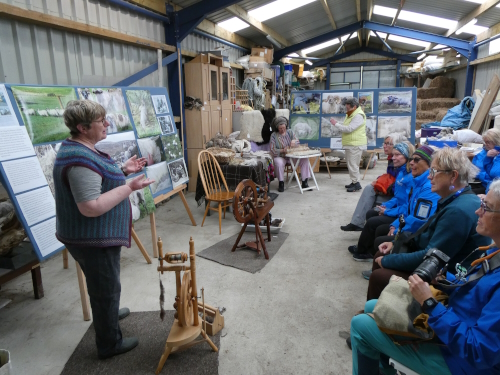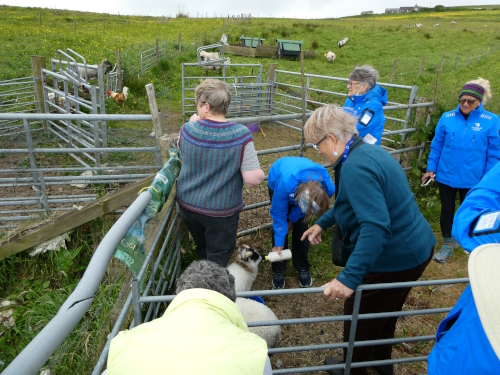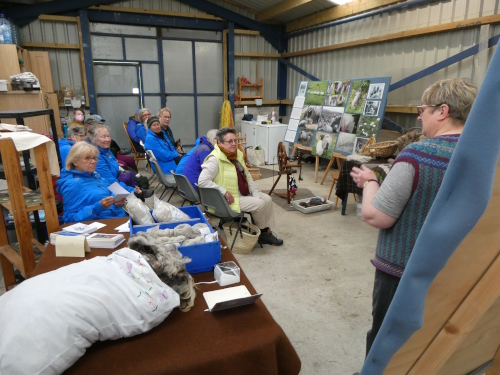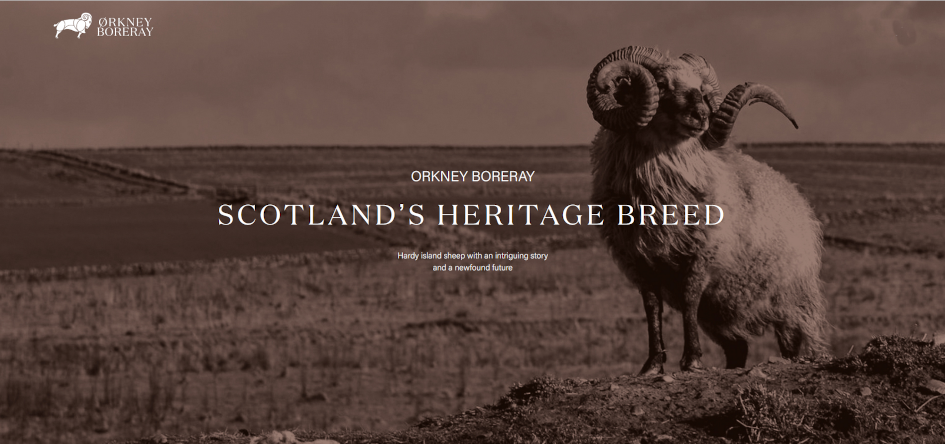We can offer personalised visits to the farm for up to eight people, at a mutually convenient time, for you to see our Boreray sheep and hear about their Neolithic, Viking, Pre-Highland Clearances and St Kilda history as well as the story of the project to save these extremely rare sheep.
Wc also offer specialised visits for organised tour groups of up to 16 people.
Full terms and conditions and details of how to book are below.
In our shed ('barn' for those from England) we have a display of posters showing the sheep and their history, and a display of fleece and woollen items.

Your visit can be personalised to cover your particular areas of interest. Examples of topics and length of visits are given below.
For smaller groups the visit is normally around 90 minutes, with flexibility, and can include seeing the sheep and a detailed talk about the history of Boreray sheep which you can choose to focus on any or all of the sheep in the Neolithic, Viking, Pre-Highland Clearances and St Kilda periods, and the recent story of the Boreray sheep in Orkney.
For groups of between four and eight people the cost is £12.5o per person. We will provide a personalised tour for one to three people but the cost per person is greater. Please contact us for full details.
For those with a special interest in the wool you can handle some double coated Boreray fleece, learn how to separate the outer and inner coats, and experience for yourself (twisting by hand) how differently the outer and inner coats behave when spun. You can also see a demonstration of spinning on a reproduction Viking spindle. We also have Orkney and Shetland wheels for spinners to try and when possible a warped up warp-weighted loom for an historical weaving experience.
We can also accommodate a shorter visit if necessary.
For organised tour groups the visit is usually two hours long and specifically designed to cover the interests of your group. Please contact us for details of charges.

The farm is managed on agroecological principles, using rotational tall grass grazing, so there will not always be a large number of sheep in fields close to the barn. For those fit enough to walk on sloping, uneven ground which can be muddy in wet weather, and with footwear that can dip into the disinfectant dips we provide for biosecurity, a farm walk to see more sheep may be possible after the talk.
There are postcards you can buy and, when available, tanned sheepskins, knitting yarn and woven goods, products made by a local craftsman from the horns, and some of the finest Boreray fleece for handspinners.
The shed enables the talk and demonstration to take place in comfort even when it's windy or raining.

~We supply hand sanitiser for you to use when you arrive and there are full hand washing facilities so you can wash your hands after the visit. This is recommended for everyone, but vital if you've handled any unwashed fleece. We can't offer any toilet facilities.
There is car parking on the driveway a short walk, on hard standing, from the shed. For disabled visitors it is possible to drive a car right up to the shed but we'll need informing in advance to get the gates opened.
Please note, we do need at least 48 hours notice to prepare for a visit. We will try and accommodate shorter notice periods where possible. Tour group organisers must contact us well in advance so we can plan an event to best meet the interests of your group and a fair charge for the group will be decided in advance of the visit.
Visits can be booked using the contact page on www.orkneyboreray.com, by emailing boreray@runbox.com or telephoning 01856 761331
Terms and Conditions
- All visits should normally be pre-booked at least 48 hours in advance to allow for preparatory work on what is a working farm.
- Any visits cancelled by the visiting group with less than 48 hours notice, a charge of £20 may need to be made to cover preparatory work and time.
- On any livestock farm unexpected things can happen. For example a talk might be unable to go ahead as planned at short notice, for example if a ewe is lambing during the time a talk would have been going on.
- Visitors must follow safety instructions on the farm, including avoiding the steep slope by the entrance to the shed that is blocked off with hurdles.
- For those taking a farm walk, it is your responsibility to ensure you have appropriate footwear, and possibly walking poles, so you can walk safely on uneven sloping ground that may be wet. Use of the disinfectant foot bath provided by anyone going onto fields is essential for biosecurity.
- Children must be fully and closely monitored by their parents at all times.
- Borerays are primitive sheep so touching the sheep is not possible.
- Hand washing facilities are provided and everyone is strongly advised to wash their hands with soap and hot water at the end of the visit for health & safety reasons.
